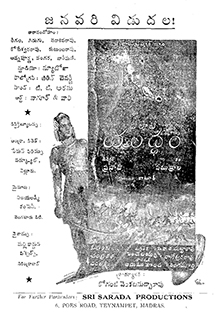Plot
During the 12th-century era Palnadu, the terrain was ruled by Aluguraju's elder son, Nalagamaraju, and his sibling Narasimharaju was the prince. They were molded & shielded by their chief minister, Brahmanaidu, the fear-defying scholar whose word is an ordinance therein. Progressive mind Brahmanaidu authorizes lower strata into the temples, which irks upper castes and turns into communal riots—moreover, signing Kannama Dasu as chief commander raises mutiny in the army too. So, Narasimha Raju moves for the aid of Nayakuralu Nagamma, a most witted & sly woman. She stepped into politics during Aluguraju's time, jockeying for leadership against Brahmanaidu, and the two became rivals. Nagamma is currently artfully puppets Nalagamaraju, instilling Brahmanaidu as an outwit, which makes him resign. Listening to it, Nalagamaraju's step-brother Malidevadulu confronts the King, seeking his share since he adores Brahmanaidu beyond the god. Despite the refusal of Nagamma, Nalagamaraju endorses Macharla to him, who proceeds with his Brahmanaidu & maternal uncle Kommaraju. Additionally, Nalagamaraju's son-in-law, Alaraju, takes his path of being true-blue, leaving behind his wife, Peerindevi, until it gets better.
Years roll by, and under the tutelage of Brahmanaidu, Macharla glitters, which irks Nagamma. Accordingly, she moves a pawn by inventing Malidevadulu to a rooster fight, Kodi Pandalu, on the eve of Sankranti. At this, Nagamma ruses with a stipulation that the exile of a loser for seven years and perfidiously triumphs. During that plight, Brahmanaidu aids as a backbone by acquiring vital for adobe. After seven years, Brahmanaidu sends Alaraju as a mediator when Nagamma magnifies Narasimharaju's urge to cabals. So, he scapegoats Aluguraju by poisoning, and Peerindevi is sacrificed by Sathi when Balachandra, the gallant son of Brahmanaidu, swears her to decapitate Narasimharaju. Once, while he was playing a game of balls, it hurt a woman, Annamma, who awakened him and furiously moved to the battle. Amid this, he spends time with his wife, Manchala, at the outset of their marital life, and Balachandra is engrossed in her beauty. Yet, Manchala arouses his valor and bravely conveys him to the field. The war begins at Karampuudi, which accelerates massive destruction at the mark of death. Balachandra dies heroically, accomplishing his pledge. Ultimately, Brahmanaidu sets out on a war field, which lets anybody withstand, and Nagamma encounters him but remorsefully bows her head down. At last, Brahmanaidu entrusts the kingdom to Nalagamaraju, proclaims Nagamma to reinstate the kingdom for her sins, and heads to penance. Finally, the movie ends with the proclamation: Wars, grudges, revenge, factions, are for destruction only Peace is the Supreme Deity.
